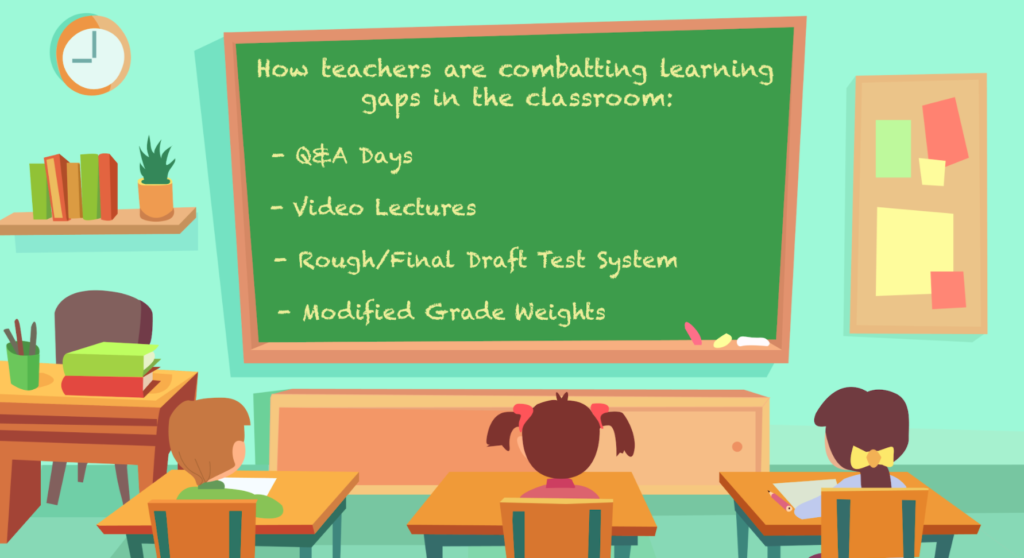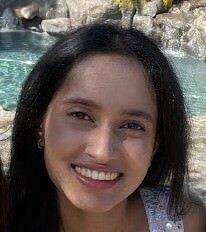To prepare for the in-person fall semester, AP Calculus BC teacher PJ Yim brainstormed multiple ways to help students who had fallen behind during the past year online. After careful consideration, he decided to implement days without planned lessons, dedicated only to answering any questions students would have.
“I‘m trying to ease them back into physical school,” Yim said.
Because of the learning gaps created by the previous year of online school, teachers have had to work harder to get students accustomed to current course materials. As a result, some teachers modified their teaching and testing procedures to help students fill holes left from learning losses.
In addition to setting aside a few days throughout the year to help students ease into the course, Yim has also integrated daily quizzes from the remote learning curriculum into his in-person curriculum. He believes a quick one or two problem quiz on the most recent class material may make feedback more accessible and, in some cases, even replace a big chapter test.
Besides modifications to testing procedures, Yim has carried over another portion of online learning to improve student performance: video lectures. To accommodate for last year’s shortened online learning periods, Yim created video lectures and assigned students to watch them for homework to maximize the use of class time, and he plans to continue doing so in-person.
“If you teach the introductory portion online, almost everybody can get that squared away, so I’m able to just focus on really intricate and hard examples in class,” Yim said.
Another modification Yim carried over from remote learning is his class’s modified grade weights. By keeping the 5 percent increased participation grade weight from remote learning, Yim hopes to reduce student grade stress and encourage students to participate more in class, which will help them build mastery of the material.
Junior Luke Wang, who is currently taking Yim’s AP Calculus BC class, said the modifications Yim has implemented into the course have made the transition smoother. He said that the daily quizzes encourage him to fully internalize the material and review daily, as opposed to his usual habit of studying last minute for assessments.
“Online learning made me forget I actually had to pay attention and focus in class instead of dozing off,” Wang said. “It also made me forget the difficulty and course load of a regular school year since online tests and course loads were much easier than in-person learning.”
Likewise, AP Calculus AB and AP Statistics teacher Jennifer Mantle has adopted testing procedures from remote learning in order to help students catch up on the material.
These adapted procedures come in the form of daily quizzes which replace mid-chapter quizzes, along with a “rough draft and final draft” system for chapter tests. The rough draft and final draft format allows students to take a version of the test in class and make corrections to it for homework before submitting both drafts in the following class.
“We wanted to try to reduce the stress of high-stakes testing, so we decided to continue the same procedure that we used last year,” Mantle said. “We intend to use these modifications all year. ”
Teachers like Yim and Mantle are willing to give these modifications since scores on the AP Statistics and AP Calculus AB and BC tests did not decrease last year. Yim said that, with the exception of two students, all of his AP Calculus BC students from last year earned a 5 on their AP tests, which is on par with results from previous years.
Junior Thea Fernandes, who is taking Mantle’s AP Calculus AB class, said she felt confident and prepared coming into the course this year, and even more so with the rough and final draft system for tests. Although she prepared for the course over the summer by looking through textbooks, solving practice problems and utilizing online resources like Khan Academy, she says the current system plays an integral component in her learning.
“I appreciate the rough/final draft system because it gives you a chance to go back and see what you did wrong,” Fernandes said. “I feel like you get a better understanding [of the material] due to having another chance to see what you did and figuring it out yourself.”
However, she said the testing procedure modification doesn’t seem fair for other students in classes operating in the typical manner, as she would be complaining if another class got this opportunity and she didn’t. Nonetheless, Fernandes feels lucky to have the rough draft and final draft testing format, as it helps her fully learn the course material.
Despite some students thinking certain learning modifications are unfair as the modifications haven’t been uniformly implemented across courses, for the time being, teachers and students alike have reached the consensus that these course modifications have served useful in slowly filling in learning gaps created from online school last year.
“I’m just doing what works,” Yim said. “Maybe two years from now, we’ll go back to the way the course was taught pre-COVID.”



























